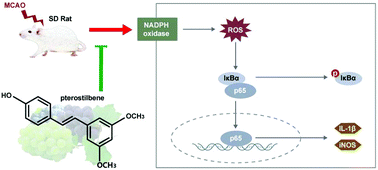WHOM in stroke is going to followup testing in human patients? Or do we have NO LEADERS IN STROKE?
Pterostilbene alleviates cerebral ischemia and reperfusion injury in rats by modulating microglial activation
Food & Function journal
Abstract
Ischemic stroke is a
severe neurological disease without known effective therapy.
Microglia-mediated neuroinflammation plays an important role in ischemic
stroke. Therefore, finding a safe and effective microglial activation
inhibitor might lead to an effective therapeutic strategy against
ischemic stroke. In this project, our goal was to explore both the
mechanism and effect of pterostilbene in MCAO/R rats. The potential
effect of pterostilbene on ischemic stroke was tested using MCAO/R rats
and its effect on microglial activation was tested in LPS-stimulated
BV-2 cells. In vivo, pterostilbene decreased the neurological
scores, brain water content and infarct volume in MCAO/R rats.
Pterostilbene increased the number of mature neurons, decreased the
number of activated microglia, and reduced iNOS and IL-1β mRNA
expression. Pterostilbene inhibited phosphorylated-IκBα expression, thus
promoting IκBα expression and inhibiting ROS overexpression. In vitro,
pterostilbene inhibited the expression of inflammatory cytokines and
suppressed NAPDH activity as well as activation of both the NF-κB
pathway and ROS production. To our knowledge, our study is the first to
demonstrate that pterostilbene-mediated alleviation of cerebral ischemia
and reperfusion injury in rats may be correlated with the inhibition of
the ROS/NF-κB-mediated inflammatory pathway in microglia, indicating
the potential for the use of pterostilbene as a candidate therapeutic
compound for ischemic stroke.(WHOM did you contact to get human testing done? No one? Good to know you are no leader, I'll be taking names.)


No comments:
Post a Comment